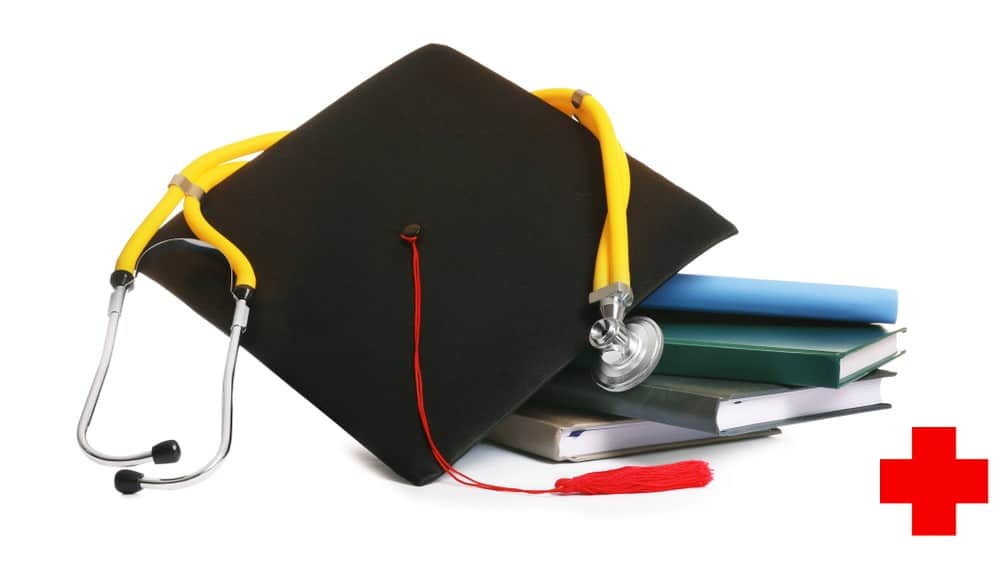Hello there, welcome to an exciting read on another graduate-level nursing program.
In this piece, we’ll break down the Direct Entry MSN programs.
We promise to help you understand what sets entry-level MSN programs apart from other professional nursing programs, their duties and responsibilities, and why the accelerated MSN program may be just the right credentialing degree for your nursing career.
We’ll shed light on the following:
- Introduction to Direct Entry MSN Programs
- Direct Entry MSN Programs without GRE
- Admission Requirement for Direct Entry Master of Science in Nursing
- MSN Nursing Careers and Salaries
- MSN Curriculum and Coursework
Without wasting time, let’s delve right in!
Introduction to Direct Entry MSN Program

A direct-entry MSN program may be a suitable choice for you if you hold a non-nursing bachelor’s degree and want to get an accredited master’s in nursing.
Graduate entry nursing programs can help you change your professional path whether you have a background in education, the arts, business, or another field.
Depending on your specialty, an MSN can also be used to qualify for an advanced practice nursing license.
Nursing professionals who want to progress in their careers can get an MSN, which allows them to expand their clinical skills and knowledge, learn new ways for developing clinical leadership skills, learn about health policy, and provide exceptional direct patient care.
Nurse Anesthetists, Nurse Educators, and Nurse Practitioners are among the advanced professions available to graduates.
Pediatric Nurse Practitioners, Cardiology Nurse Practitioners, and Family Nurse practitioners are some of the specialties available to Nurse Practitioner majors.
While MSN graduates are frequently employed at hospitals or physician offices, they also have the qualifications to work independently and establish their own practice.
This article will answer your questions about how to choose a school and what to expect if you are inquisitive about direct-entry MSN programs.
Direct Entry MSN Programs Without GRE

Direct entrance is available in many MSN colleges.
MSN with no GRE programs is designed to give you both a master’s degree and a bachelor’s degree in a single program.
Direct-entry MSN programs are designed specifically for students with a bachelor’s degree in a subject other than nursing.
As a result, direct-entry nursing programs cover bachelor’s-level material first, preparing you to obtain your Registered Nurse (RN) licensure.
Additionally, if you want to combine your business principles with nursing skills, you could be interested in the combination MBA/MSN programs offered by selected universities.
Following your RN certification, the curriculum progresses to masters-level study, which will prepare you for Advanced Practice Registered Nursing roles.
An expert with an MSN may work in one of the following jobs, depending on their licensed specialty:
- Nurse Practitioner
- Registered Nurse
- Nurse Anesthetist
- Nurse Midwife
- Critical Care Nurse
- Clinical Nurse Specialist
- Public Health Nurse
Your coursework may include a variety of themes at the master’s and bachelor’s levels, and your course topics may include:
- Clinical nursing for women and families
- Nursing interventions
- Foundations of healthcare quality
- Pharmacology
- Health informatics
- Palliative care
- Wellness across the lifespan
- Pediatric nursing
- Evidence-based practice
In order to graduate with your degree, you may be needed to complete a certain amount of clinical placement hours in addition to a variety of curricula.
Admission Requirement for Direct Entry Master of Science in Nursing

Direct-entry MSN programs offer a quick start to a student’s career as an Advanced Practitioner in the field of nursing (APRNs).
Clinical experiences are significantly weighted in these programs.
The following is a rundown list of some of the most popular entry requirements:
- Students should anticipate submitting GRE scores (if necessary), letters of recommendation, a resume, an entrance essay, and perhaps an interview as proof of receiving a bachelor’s degree from a nationally or regionally accredited school
- A minimum 3.0 GPA is commonly required for MSN programs
- Applicants with a bachelor’s degree earned outside of the United States may be required to submit additional paperwork before the application deadline to meet admission requirements
Direct-Entry MSN Curriculum

If you choose an Accelerated Nursing Program, you may be required to complete a bachelor’s degree in nursing before moving on to master’s degree coursework.
You may take the following courses as part of your direct entry MSN program:
- Community and Population Health Improvement
You’ll learn about the principles and best practices of public and community-based healthcare.
- Ethical and Legal Accountability in Professional Nursing Practice
in this course, you are expected to learn about various legal and ethical deliberations in the domain of nursing, including nursing liability.
- Fundamentals of Clinical Nursing Practice
You’ll learn about real-world nursing applications like patient assessment, care planning, healthcare intervention, and care delivery.
- Pharmacology for Nursing Care
You’ll gain a foundational understanding of pharmacological practices while learning about the role of nursing in therapy and drug treatment.
- Individual Psychotherapy
This course covers key theories in the field of nursing psychotherapy practices.
- Pediatric Health Theory
In this course, you will learn about some of the most important theories in pediatric healthcare.
- Leadership and Management in Nursing Practice.
You’ll learn about key concepts in nursing leadership and management, such as team building, decision-making, and conflict resolution.
- Management of Chronic and Episodic Health Issues in Acute Care Settings
You’ll learn how to manage chronic and episodic health issues in acute care settings.
- Evidence-Based Practices in Family Nursing Practice in Midwifery Care for Families with High-Risk Pregnancies
You’ll learn about evidence-based procedures in family nursing practice in midwifery care for households with high-risk pregnancies.
- Basic Principles of Anesthesia – Fundamental Practices, Techniques, and Responsibilities
This course covers the fundamental practices, techniques, and responsibilities associated with the use of anesthesia.
Once you’ve completed your master’s degree, you may have the option to choose from and specialize in a variety of educational concentrations.
As a result, the courses you take as part of your master’s program will vary greatly relying on the specialty you choose to pursue.
MSN Nursing Careers and Salaries

While most people associate Nurses with working in hospitals, there are a variety of other industries and jobs that may require nursing expertise.
Physician offices, Outpatient health centers, residential care facilities, and nonprofit organizations are examples of these.
Direct admit nursing programs, according to the BLS (Bureau of Labor Statistics), can help you qualify for licensure and a number of options in the profession of nursing, depending on your concentration.
Beyond obtaining a BSN, having this degree can offer numerous more doors.
While RNs earn an average of $64,100, MSN graduates earn an average of $86,100.
As documented by BLS, over the next several years, a number of nursing positions are expected to enjoy significant job growth.
Nurse Practitioners (31-32% job growth), Nurse Midwives (11-12 percent job growth), Medical and Health Services Managers (31-32% job growth), Nurse Anesthetists (13-14% job growth), and Registered Nurses (6-7 percent employment increase) are among these occupations (50-52 percent ).
List of Direct Entry MSN Programs

These programs are also referred to as direct-entry MSN programs for non-nursing majors.
Listed below are top-ranking schools for MSN for non-nurses:
Nashville, Tennessee’s Vanderbilt University
Multiple entrance options and flexible course delivery are available for the Master of Science in Nursing at Vanderbilt University, which combines hybrid courses and intense block forms for on-campus meetings.
Registered Nurses with a Bachelor’s Degree in Nursing are eligible to apply for the MSN with advanced practice specialties.
The specialty master’s program is open to students who do not have a Bachelor’s Degree in Nursing.
Program: Master of Science in Nursing
Accreditation: Commission on Collegiate Nursing Education accreditation.
$1,795 per credit in tuition.
Admission requirement: Minimum 3.0 GPA, Bachelor’s degree, three letters of recommendation, and a statement of purpose are all required for admission.
Program Duration: 2 years.
Location: on-campus.
Pass Rate for NCLEX-RN at School: 95 percent first-time pass rate.
The University of California, Los Angeles (UCLA)
UCLA, one of the country’s Public Ivies, offers two MSN programs with direct entry.
Scholars who have successfully completed a bachelor’s degree in a non-nursing subject and want to pursue a nursing career can apply for the master’s entry clinical nurse degree.
The Master’s of Science-advanced practice Degree is open to Registered Nurses with a Bachelor’s Degree in Nursing.
Program: Master of Science in Nursing
Accreditation: Commission on Collegiate Nursing Education accreditation.
Tuition: In-state students pay $25,850 in tuition; out-of-state students pay $38,100.
Admission requirement: Bachelor’s degree from an approved college with a minimum 3.0 GPA and three letters of recommendation are required.
Length of Program: 2 years.
Location: on-campus.
NCLEX-RN Pass Rate at School: 97 percent of students passed the exam the first time.
Baltimore, Maryland’s Johns Hopkins Direct Entry MSN
Students who have a bachelor’s degree in a non-nursing discipline and want to pursue a master’s degree in nursing can enroll in Johns Hopkins’ direct-entry MSN program.
The on-site full-time entry-level nursing program prepares students for the NCLEX exam.
Global impact, safety and quality, evidence-based professional education, and leadership are all emphasized in the curriculum.
Program: Direct entry into Master of Science in Nursing
Commission on Collegiate Nursing Education accreditation.
$1,791 per credit in tuition.
Admission requirement: Bachelor’s degree from an approved college with a minimum 3.0 GPA and three letters of recommendation are required.
Length of Program: 2 years.
Location: on-campus.
NCLEX-RN Pass Rate at School: 97.4 percent of students passed the exam the first time.
According to College Scorecard, the average earnings twenty-four months after graduation for master’s grads is $95,400.
The School of Nursing, University of Pennsylvania, Philadelphia, Pennsylvania
The University of Pennsylvania’s well-regarded school of nursing offers a direct-entry MSN program that prepares students with a bachelor’s degree in another discipline for employment as Nurse Midwives or Nurse Practitioners.
Minors in health informatics, palliative care, and adult oncology care are available to MSN students who want to expand their areas of competence.
Program: Master of Science in Nursing
Accreditation: Commission on Collegiate Nursing Education accreditation
Tuition: A total program cost of $118,100.
Admission requirement: Bachelor’s degree from an approved college with a minimum 3.0 GPA, three letters of recommendation, and a personal statement are required.
Length of Program: 1.5 years.
Location: on-campus.
Pass Rate of NCLEX-RN at School: 94.7 percent of students passed the exam the first time.
According to College Scorecard, the average earnings twenty-four months after graduation for master’s grads is $109,200.
Yale University New Haven, Connecticut.
Next on our list is Yale University.
Established in 1701, Yale is one of the country’s most famous and oldest higher education institutions.
For those without a bachelor’s degree in nursing, the school of nursing provides a direct-entry MSN program.
Before joining a clinical specialty, these students undergo a graduate entry specialty per year.
Students who join the school with a nursing license go straight into specialization and finish in twenty-four months.
Program: Master of Science in Nursing
Accreditation: Commission on Collegiate Nursing Education accreditation.
$23,560 per semester in tuition.
Admission requirement: Bachelor’s degree from a recognized college and a minimum of 3.0 GPA minimum, two short-answer essays; comprehensive and integrated essay; and three letters of recommendation.
Length of Program: 2 years.
Location: on-campus.
Pass Rate for NCLEX-RN at School: 95 percent first-time pass rate.
What to Look out for in MSN Direct Entry Programs
Since students frequently attend classes full-time and also work, MSN programs frequently accommodate atypical learners.
To choose an excellent curriculum that best matches their particular needs, prospective students should consider the following parameters:
Admissions Requirements
The standards for admission differ from one school to the next.
For instance, some programs may require students to take the GRE, indicating that the school has tougher admissions requirements.
Learners, on the other hand, may desire schools that do not require this exam in order to begin coursework as soon as possible.
Nursing Program Curriculum
MSN candidates usually have a clear idea of which specialist field they wish to follow.
Students should ensure that the school offers a high-quality curriculum in their chosen field.
Applicants should evaluate programs to find which colleges offer the greatest course alternatives.
Clinical Experience
Clinical placement can be approached in a variety of ways by MSN programs.
Some schools supervise clinical placement completely, while others allow students to choose their own clinical site and preceptor.
Accreditation
Reputation, trustworthiness, and licensure are all important factors in the nursing sector.
To qualify for licensure after graduation, students should only explore nationally or regionally certified schools.
Program Duration
MSN programs come in a multiplicity of configurations to suit the demands of students.
Part-time students may take up to forty-eight months to complete their degree, whereas full-time students might successfully finish their degree program in as little as a year and three months.
Pass Rate for NCLEX
Students can judge how effectively each program prepares graduates by looking at the school’s pass rates for NCLEX.
Students should look for schools that have a higher pass rate than the national average, which is now 83.76 percent for students educated in the United States.
Graduation Rates
Graduation rates at schools can reveal how well programs support and prepare students throughout their academic careers.
Students may want to look into programs that refuse to share this information further.
What Is the Importance of Accreditation for a Direct-Entry Masters in Nursing Program?
Accreditation is the process of assessing universities and colleges to ensure that they provide a high-quality education to their students.
Independent organizations evaluate higher education programs and provide or deny accreditation.
Students should be aware of non-accredited programs or colleges.
Graduate schools admit students who have earned a bachelor’s degree.
Unaccredited school credits are rarely transferable to other programs.
Accreditation offers numerous advantages, including:
- Getting students ready for the NCLEX-RN licensure exam
- Assisting in determining how well programs surpass or meet basic quality criteria
- Assisting students in receiving federal financial aid, which an unaccredited school may not be eligible for
- Assuring that graduates who desire to continue their studies can do so by enrolling in DNP programs
- Employers will receive a bonus if they consider where students received their degrees
Students may desire to explore programmatic accreditation through organizations such as the Commission on Collegiate Nursing Education to set themselves apart from other graduates.
Scholarships and Financial Aid

While enrolling in a direct nursing MSN program is critical to aspiring nurses’ success, students need also think about the whole cost of their education and how they will pay for it.
In-state tuition, for instance, is usually less expensive than out-of-state tuition.
In the same way, schools may charge a lesser fee for online courses.
Students enrolled in an authorized direct MSN program can apply for financial aid by filling out the free FAFSA form.
Loans and grants are available from the federal government.
Students should be aware that while grants are not repaid, loans must be repaid six months after graduation.
Nursing students are also eligible for a variety of grants and scholarships, which are frequently sponsored by other organizations or by their institutions.
Conclusion

Direct entry MSN programs are the best fit if you want to do something that is hard, exciting, and makes a difference in people’s lives on a daily basis, you should consider pursuing a career in nursing.
This program helps you transition smoothly into the high-demand area of advanced practice nursing, preparing you for national board certification and a wide range of employment prospects in clinical leadership, settings, and academics.
From 2020 to 2030, the employment of Registered Nurses is expected to expand at a rate of 7-9%, which is approximately higher for every other occupation.
In a lengthy span of ten years from 2020, an average of 194,600 openings for Registered Nurses are expected.
FAQs

Can I Get My MSN Right After My BSN?
The most common route to a master’s degree in nursing is to complete a bachelor’s degree program in nursing (BSN). To choose this path, you must first obtain a Bachelor of Science in Nursing (BSN) and then enroll in a master’s program. This full-time MSN program lasts about two years.
What is a Direct Entry MSN Program?
A direct-entry MSN program is meant to assist students in entering the nursing profession without first obtaining a Bachelor’s Degree in Nursing (BSN). These accelerated MSN programs could help students save money and time by building on their past knowledge.
How Competitive are Direct Entry MSN Programs?
According to a News poll, the average acceptance percentage for the 203 ranked nursing institutions that reported receiving at least 9-10 master’s program applications for fall 2019 was 66.1 percent.
How Many Years Does it Take to Get a Masters in Nursing?
Students enrolled in Master’s Degrees gain access to expert-level abilities and knowledge. Most scholars who enroll in these programs have already completed a bachelor’s degree. While the length of a master’s degree program depends on a variety of circumstances, most Master’s in Nursing Degree programs last two to three years.
How Much are Direct Entry MSN Programs?
Total Estimated Tuition for a Master of Science in Nursing (Direct Entry) is around $63,500 – $65,600 for credit hours of 150-155. Pre-licensure Cost Per Credit Hour ranges from $800 to $850, while post-licensure Cost Per Credit Hour ranges from $400 to $450.
How Long are Direct Entry MSN Programs?
Students should be aware that a direct-entry MSN program can take anywhere from 18 to 36 months to graduate from the program, depending on the curriculum and enrollment status. Certain course requirements may be waived for students who have appropriate prior transferable credits or coursework.
How Much Do MSN Nurses Make in California?
Nurses with a Master’s Degree in Nursing will earn an average annual salary of $135,950 in California.
Is Direct Entry MSN Worth it?
If you know you want to work as an Advanced Nurse, a direct-entry MSN can be worth it. Students should, however, be prepared to put forth a lot of effort. Programs, like nursing, can be fast-paced and intensive.
Is the MSN Program Difficult?
While the main answer to that question varies depending on the institution you attend, you can expect master’s degree courses to be tougher than any undergraduate coursework you’ve taken. MSN applicants are often required to take advanced anatomy and science courses.
What is the Difference Between BSN and MSN?
The fundamental distinction between a BSN and an MSN degree is that a BSN is a bachelor’s degree, whilst an MSN is a master’s degree.
What is the Masters in Nursing Online Program Admission Requirements?
At least a GPA point of 3.0 or above. A BSN or any other field unrelated to nursing is required. Prerequisite courses must be successfully completed within the last six months. Letters of recommendation and/or Professional references. Licensure as a Registered Nurse. Scores on the Graduate Record Examinations (GRE).









